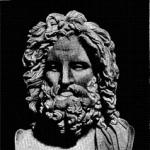I QUOTE: “First of all, it must be said that the expression “may the earth rest in peace” has not atheistic roots, but pagan ones. This expression originates from ancient Rome. Latin it will sound like this - “Sit tibi terra levis”. The ancient Roman poet Marcus Valerius Martial has the following verses: “Sit tibi terra levis, molliquetegaris harena, Ne tua non possint eruere ossa canes.” (May the earth rest in peace to you, And softly cover the sand so that dogs can dig up your bones)
Some philologists believe that this expression was a funeral curse addressed to the deceased. However, we have no reason to say so, because this expression was used even before Martial. On ancient Roman tombstones you can often see the following letters - S·T·T·L - this is an epitaph from - “Sit tibi terra levis” (may the earth rest in peace). There were options: T·L·S - “Terra levis sit” (May the earth rest in peace) or S·E·T·L - “Sit ei terra levis” (May the earth rest in peace). Currently, a similar epitaph can be found in English-speaking countries, where tombstones often have the inscription - R.I.P. (Rest In Peace) - rest in peace.
That is, the expression “may the earth rest in peace” is much older than atheism and carries precisely religious connotations, not atheistic ones. Is it possible for a Christian to use this expression? Definitely not, because Christianity is fundamentally different from pagan ideas about the afterlife of the soul. We do not believe that the soul is in the earth along with the decaying body. We believe that when a soul dies man is walking to God for a private trial, which decides where she will await the general resurrection on the eve of Paradise or on the eve of hell. The pagans had a completely different idea. They wanted “the earth to rest in peace,” meaning that it would not put pressure on a person’s bones and would not cause discomfort to the deceased. By the way, hence the pagan fears of “disturbing the dead” and myths about rebel skeletons, etc. That is, all this points to the pagan belief that the soul can reside next to its body or even in the body itself. That's why there are such wishes.
I also often hear people use the expression “may the earth rest in peace,” but I have never seen a person who would put exactly the ancient pagan content into this expression. Mostly among people untrained in faith, the expression “may the earth rest in peace” is used as a synonym for the words “Kingdom of Heaven.” You can often hear these expressions in conjunction.
Here you need to have reasoning and a sense of spiritual tact. If you heard a grief-stricken person say at a wake “may the earth rest in peace,” then this probably won’t be the most best moment to reason with him or lead discussions. Wait for the time and when the opportunity presents itself, very carefully tell the person that Orthodox Christians do not use such an expression." /end quote/
Parable of the good and evil cherry tree St. Nicholas of Serbia One man had two cherries in front of his house. One was evil and the other was good. Whenever he left the house, they called him and asked him for something. The evil cherry asked for different things every time: “dig me in,” then “whiten me,” then “give me something to drink,” then “take away excess moisture from me,” then “shade me from the hot sun,” then “give me more light.” . And the good cherry tree always repeated the same request: “My lord, help me bring a good harvest!” The owner was equally merciful to both, looked after them, listened carefully to their requests and fulfilled all their desires. He did what both one and the other asked, in other words, he gave the evil cherry everything that it demanded, and the good one only what he considered necessary, with the ultimate goal being a wonderful, abundant harvest. And then what happened? The evil cherry tree had grown greatly, the trunk and branches glistened as if smeared with oil, and the abundant foliage was dark green, spreading, like a thick tent. In contrast to her, kind cherry with his appearance didn't attract anyone's attention. When the harvest time came, the evil cherry produced small, rare fruits, which, due to the thick foliage, could not ripen, but the good one brought a lot of very delicious berries. The evil cherry tree felt ashamed that it could not produce such a harvest as its neighbor, and it began to grumble at the owner, reproaching him for this. The owner got angry and replied: “Is it my fault?” Wasn’t it me who fulfilled all your desires for a whole year? If you thought only about the harvest, I would help you bring the same abundant fruits as hers. But you pretended to be smarter than me, who imprisoned you, and that’s why you remained barren. The evil cherry tree bitterly repented and promised the owner that next year she would think only about the harvest, and would ask him only for this, and would leave everything else to him to take care of. As she promised, she did so - she began to behave like a kind cherry. And on next year both cherries brought the same good harvest, and their joy, like the owner’s, was great. The moral of this simple parable is clear to all who pray to God. The owner of the garden is the God of this light, and people are His seedlings. Like any owner, God requires a harvest from His plants. “Every tree that does not bear fruit is cut down and thrown into the fire!” - says the Gospel. Therefore, first of all and most of all, you need to take care of the harvest. And we must pray to the Owner - God, the “Lord of the Harvest”, for a good harvest. There is no need to ask the Lord for small things. Look, no one goes to the king of the earth to ask him for some little thing that can easily be obtained elsewhere. “Our Lord is the Lord the Giver,” says Saint John Chrysostom. He loves when His children ask Him for something great, worthy of a prince. And the greatest gift that God can give to people is the Kingdom of Heaven, where He Himself reigns. Therefore, the Lord Jesus Christ commands: “Seek first the Kingdom of God, and the rest will be added to you.” And He also commands: “Do not worry about what you will eat, or what you will drink, or what you will wear. Your Heavenly Father knows that you need all this.” And He also says: “Even before you pray, your Father knows what you need!” So what should you ask God for? First of all, what is the best, the greatest and the most infinite. And these will be those spiritual riches that are called by one name - the Kingdom of Heaven. When first of all we ask God for this, He gives, along with this wealth, everything else that we need in this world. Of course, it is not forbidden to ask God for the rest of what we need, but this can only be asked at the same time as the main thing. The Lord Himself teaches us to pray for bread every day: “Give us this day our daily bread!” But this prayer in the “Our Father” is not in first place, but only after the prayer for the holy name of God, for the coming of the Kingdom of Heaven and for the dominion of the will of God on earth as it is in Heaven. So, first spiritual benefits, and only then material ones. All material goods- from dust, and the Lord easily creates them and easily gives them. He gives them according to His mercy even to those who do not ask for it. He gives them to animals as well as people. However, He never gives spiritual benefits either without human will or without seeking. The most precious riches, that is, spiritual ones, such as peace, joy, kindness, mercy, patience, faith, hope, love, wisdom and others, God can give as easily as he gives material goods, but only to those who love these spiritual treasures and who will ask God for them.
The sentence “may the earth rest in peace” has quite ancient roots, dating back to the times when paganism dominated the earth. According to most historians, it came to us from Ancient Rome, where these words sounded in Latin as “Sit tibi terra levis”.
The wish for a “land made of fluff” was used by some Roman poets and philosophers in their works. Thus, in the poems of a certain Mark Valery Martial there are the following lines: “Sit tibi terra levis, molliquetegaris harena, Ne tua non possint eruere ossa canes,” in other words, “May the earth rest in peace and softly cover you with sand, so that dogs can dig your bones." What did this phrase mean to the Romans: a wish for good or, on the contrary, was it used as a curse?

A wish for good or evil?
Undoubtedly, from the point of view modern man Martial’s continuation of the common Latin expression “Sit tibi terra levis” sounds like a wish for evil and torment even after death. Nevertheless, we should not forget that we are still talking about paganism, which means that it is not worth interpreting the poet’s words in the light of today’s culture, civilization or religion. Moreover, archaeologists find the abbreviation of the wish “Sit tibi terra levis” - “S.T.T.L” on many gravestones of those times. There were also various interpretations this phrase: T·L·S - “Terra levis sit” (May the earth rest in peace) or S·E·T·L - “Sit ei terra levis” (May the earth rest in peace).

The fact is that pagans often believed that the human soul does not disappear from the body after death, and therefore, if desired, the deceased can turn around, sit down, stand up, or even go somewhere. It was precisely in order for the deceased to lie comfortably in the grave or, if necessary, to get out, that they wished him “rest in peace.”
Attitude to the phrase from a religious point of view
Some people mistakenly believe that the expression “may you rest in peace” is absolutely identical to the wish for the “Kingdom of Heaven.” However, Orthodox priests argue that this is far from the case. In their opinion, “Sit tibi terra levis” is a pagan phrase and has nothing to do with Christianity. After all, according to Christian teaching, the soul does not remain in a dead body, but leaves it, rushing to the judgment of God. This means that this phrase should not be uttered by a believer.
May I rest in peace to whom. In speech etiquette: good remembrance of the deceased, arising from the superstitious idea of afterlife. - Don’t you remember Vasya from Taganrog? Vasya-Vasilyok? Well, he amused us with the guitar. He was a good guy. As they say, may he rest in peace(V. Massalitin. Old scars). - At that time, we quarreled strongly with the late Mr. Voronin, we swore mercilessly - may he rest in peace, he was a good man, if only he had become a true sailor, he would not have lived to live, it’s a pity(Yu. German. Young Russia). We stood in front of the grave for several minutes. - Farewell, our comrade in arms! We will never forget you... We will avenge your death! May the earth rest in peace to you. - Bondarenko could not speak further, he turned to the side and wiped away a tear(V. Pichugin. The Tale of the Red Tie).
Russian phraseological dictionary literary language. - M.: Astrel, AST. A. I. Fedorov. 2008.
See what “Rest in peace” is in other dictionaries:
May I rest in peace- to whom. Razg. In speech etiquette: kind remembrance of the deceased. F 1, 210; ZS 1996, 181 ...
EARTH- Far away. Razg. Very far away. FSRY, 173; SHZF 2001, 77; BTS, 1345; Mokienko 1986, 203; Yanin 2003, 109; BMS 1998, 209 210. To be in the ground. Komi, Sib. About the deceased. Kobeleva, 64; FSS, 20; SBO D1, 49. Live on the white land. 1. Yarosl. Outdated Not… … Large dictionary of Russian sayings
Earth- I and/, wine; ze/mlu; pl. ze/mli, zem/l, ze/mlyam; and. 1) Earth/Third Planet solar system, rotating around its axis and around the Sun, the orbit of which is between Venus and Mars. The Earth/ moves around the Sun. Circumference of the Earth. Moon… … Dictionary of many expressions
Earth Dictionary Dmitrieva
Earth- Earth and earth noun, f., used. max. often Morphology: (no) what? land, what? earth, (see) what? land, what? earth, about what? about the earth; pl. What? land, (no) what? lands, what? lands, (I see) what? land, what? lands, about what? about the earth planet... ... Dmitriev's Explanatory Dictionary
Earth Encyclopedic Dictionary
Earth- 1. EARTH, and, wine. land; pl. lands, lands, lands; and. 1. [with a capital letter] The third planet of the solar system, rotating on its axis and around the Sun, the orbit of which is between Venus and Mars. Earth moves around the Sun. Circumference... ... Encyclopedic Dictionary
May the earth rest in peace- POOH, a (y), about fluff, in fluff, m. Ozhegov’s Explanatory Dictionary. S.I. Ozhegov, N.Yu. Shvedova. 1949 1992 … Ozhegov's Explanatory Dictionary
May God grant that the earth lies on it in light fluff!- See LIFE DEATH... V.I. Dahl. Proverbs of the Russian people
May God grant that the earth lies on it in light fluff- God grant that the earth lies on it in light fluff. Wed. May God grant his soul salvation, And his bones rest in the grave, in the damp mother earth. A. S. Pushkin. Evg. Oneg. 7, 18. Anisya. Wed. Molliter ossa cubent. Let the bones lie softly. Ovid. Trist.… … Michelson's Large Explanatory and Phraseological Dictionary (original spelling)
Books
- Vladimir Kolychev (set of 28 books), Vladimir Kolychev. Vladimir Kolychev burst into the ranks of the best Russian writers of the crime genre like a meteor. Action-packed novels, such as “The detective and the thief are brothers forever”, “Black justice”, “And life... Buy for 6300 rubles
- In search of lost antiquity. Collection of Russian costume by Alexander Kolesnikov, Kolesnikov A.. “My most important academy is my great-grandmothers, grandmothers and aunties, May they rest in heaven, may they rest in peace and eternal peace... . . When I turned five years old, the age from which in the peasant...
2
The Russian language is simply a storehouse of all kinds of catchphrases and aphorisms, the origin of which should be sought in the depths of history. Probably every person will definitely attend a funeral at least once in his life; if not someone else’s, then he certainly won’t ignore his own. Do you know what the most popular phrase comes to mind when you start thinking about this sad event? Usually, an individual repeats a hackneyed proverb covered with the dust of generations " May he rest in peace", the meaning of which he does not fully understand. To decipher these and many other expressions, we have created a website, so add this resource to your bookmarks, we have useful information almost every day.
However, before I continue, I would like to show you some more popular news on the topic of sayings and proverbs. For example, what does it mean to rest in God; how to understand Wet the crusts; which means God protects the one who is taken care of; the meaning of the expression Sprinkle ashes on your head, etc.
So let's continue what does rest in peace mean??
May I rest in peace- this expression usually ends a funeral speech
May he rest in peace is a synonym for the expression " kingdom of heaven", and sometimes these two phraseological units are used in conjunction, although this is fundamentally wrong
Origin" May the earth rest in peace to you" has pagan roots. This phraseology first began to be used during the times of Ancient Rome, and sounded like this: " Sit tibi terra levis". The quote itself was borrowed from the Roman author Mark Valery Martial, famous in narrow circles - "Sit tibi terra levis, molliquetegaris harena, Ne tua non possint eruere ossa canes", which can be translated as "May the earth rest in peace to you, And softly cover sand so the dogs can dig up your bones."
Some historians believe that this is a kind of ancient Roman curse, for example, if the deceased has greatly annoyed you with something. After all, no one wants dogs to eat the meat off your bones.
However, most philologists are convinced that this is not entirely correct interpretation, because this phrase was used long before this famous poet.
If we “dig” deeper, we can find out that ancient tombstones with the letters “engraved” have survived to this day. S·T·T·L", as you already understood, this is an abbreviation for the expression "Sit tibi terra levis." Although there were several versions of such epitaphs, their meaning boiled down to one thing - "Rest in peace."
Anyone who played with old toys probably noticed that after the death of the hero, a gravestone appeared with the abbreviation " R.I.P.“(Rest In Peace), which means “rest in peace.” In fact, this is an analogue of the ancient epitaph that was used in the Roman Empire.
Based on the above, we can conclude that this phrase contains deep religious motives, and far from Christian ones.
So why did people want The earth rest in peace? The fact is that in those days, humanity was quite wild, and believed in all these pagan ideas about the world around us. At that time, it was believed that the soul of a person continues to remain in the body after death. And if the deceased is uncomfortable or something causes discomfort, he will be able to get out of the grave. It is because of these beliefs that people are still afraid to disturb the peace of the dead, and they even make films about the rise of the dead from their graves.
True, if you hear a grief-stricken wife talking about her late husband - “May he rest in peace,” then this is clearly not the moment when she needs to be guided on the right path. If you still want to tell a person what the true meaning of “Rest in peace” is, then you need to find time and explain that Orthodoxy does not use this phraseological unit.
After reading this article, you learned what does rest in peace mean?, and now you won’t get caught again





